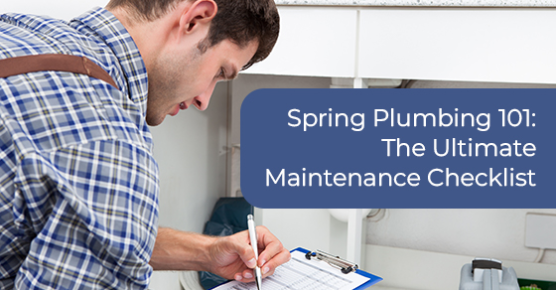


Spring is just around the corner, so it’s time to ensure your home’s plumbing system is in top condition. After all, winter can be tough on pipes. Follow this maintenance checklist to prevent unfortunate water damage or a devastating flood.
Is there a slow drain in a sink, shower, or bathtub? Slow drains indicate that a clog is forming somewhere in your plumbing system. Clogs do not care for themselves, so the issue will worsen if left untreated. Plus, any blockages in your pipes will stink as the weather warms up. Harmful bacteria and germs accumulate in blocked pipes, along with rotting food debris and grease.
As the clog worsens, a catastrophic amount of pressure can build up. The pipe might burst, and you must deal with a very awful and damaging situation.
You’re most likely to find a drain blockage in kitchens and bathrooms. Food debris and grease build up in kitchen drains, whereas bathroom drains must contend with hair and residue from personal care products. Dirt and leaves also clog down floor drains in patios, basements, and driveways.
If you have a slow or clogged drain, your first instinct is to purchase a commercial draining cleaning product. However, these products often fail to remove all the accumulated debris in your plumbing system. They tend to push the clog further into the pipes, making it even harder to access. The best thing you can do for a clogged drain is to call your plumber.
It would be best to look for leaks in the toilet bowl and the tank. Add a few drops of food colouring to the tank to check for leaks.
Wait thirty minutes to an hour to see if any dye appears in the bowl. If you see colour in the bowl, then there’s probably a leak in the system that needs to be repaired by a professional plumber.
It’s easy to miss under-sink leaks. Many homeowners don’t notice that a small leak has developed under the sink for weeks- or even months! Unfortunately, these minor leaks can have significant consequences.
Over time, all that moisture promotes mould and mildew growth. The humidity can also attract pests like ants and cockroaches. Consequently, an essential part of spring plumbing maintenance is grabbing a flashlight and closely inspecting the area below your home’s sinks. Check to see if you can see any signs of dripping or pooling water.
Mineral deposits build up in your shower head over time. They can lead to uneven or reduced water flow, which detracts from a relaxing shower experience.
To fix it, tie a bag of vinegar around the shower head and leave it to soak overnight. The vinegar will remove any mineral deposits.
It would be best to regularly inspect appliances like dishwashers, washing machines, and ice makers for leaking, bulging, or discoloured water supply hoses.
You should replace the hose entirely if it’s older than ten years or showing any signs of weakness. In this case, it’s time to switch to stainless steel hoses. Stainless steel hoses are more robust, more reliable, and less prone to wear and tear.
It’s essential to test your sump pump regularly. After all, this device can save you from a massive and expensive leak in your basement. To test your sump pump:
The average lifespan of a water heater is 10-15 years. As it nears the end of its life, your water heater will perform less efficiently and may develop additional problems. You will likely spend more on your energy bills as a result.
Professional maintenance is essential to keeping your water heater running at its best for as long as possible. If your water heater is acting strange, contact your plumber immediately. Here are a few signs that it needs immediate maintenance or repair:
Dripping faucets can become a massive drain on your wallet. All those drips do add up, after all! Fix that annoyingly dripping faucet to avoid paying more on your monthly utility bills. Usually, it’s a quick fix.
The drip is often a result of a damaged washer inside the fixture, worn-out seats and springs, or O rings that need replacing.
If you hear running water long after flushing the toilet or when the bathroom is not in use, then you have a problem with a running toilet.
A running toilet wastes an immense amount of water. This isn’t good for your wallet and for the environment. There are several probable causes which you should try to fix immediately:
Remember to check your home’s outdoor plumbing and draining this spring. Most homeowners opt to shut off the water to exterior hose bibs, spigots, and faucets during cold weather to prevent pipes from bursting.
However, this can make existing leaks undetectable… until you turn the water back on. Make sure you keep an eye on any outdoor taps to see if they’re leaking.
Don’t get caught off guard this spring by a surprise leak or expensive utility bill. Contact your professional plumber at Advanced Plumbing. We can handle all of your plumbing needs!
To book an appointment, call Advanced Plumbing today at 866-863-9539 or contact us here.